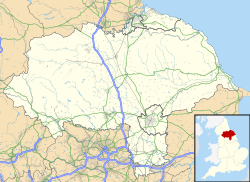| Womersley | |
|---|---|
 St Martin's Church | |
Location within North Yorkshire | |
| Population | 363 (2001 census) |
| OS grid reference | SE531419 |
| Unitary authority | |
| Ceremonial county | |
| Region | |
| Country | England |
| Sovereign state | United Kingdom |
| Post town | DONCASTER |
| Postcode district | DN6 |
| Dialling code | 01977 |
| Police | North Yorkshire |
| Fire | North Yorkshire |
| Ambulance | Yorkshire |
| UK Parliament | |
Womersley is a village and civil parish in North Yorkshire, England. In 2001 the parish had a population of 363. The parish population at the 2011 census (including Stapleton and Walden Stubbs) was 515. [1] It is near the towns of Selby, Askern and Pontefract. It is close to the borders with South and West Yorkshire.
Contents
The village was part of the West Riding of Yorkshire until 1974. [2] From 1974 to 2023 it was part of the district of Selby, it is now administered by the unitary North Yorkshire Council.
